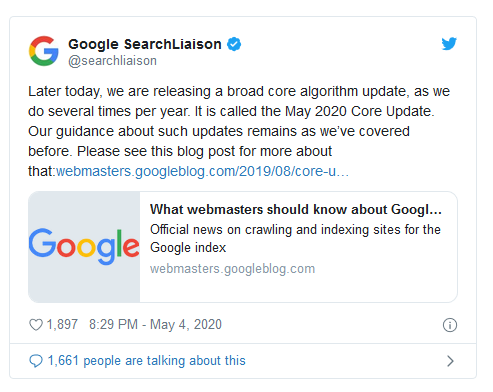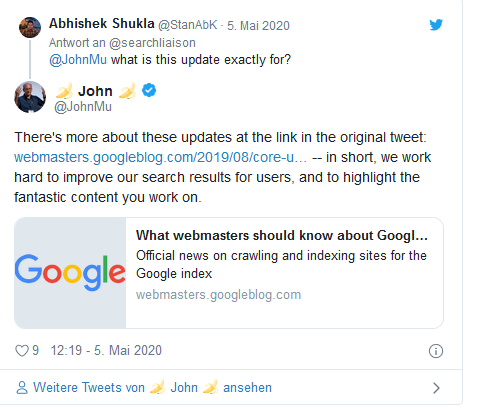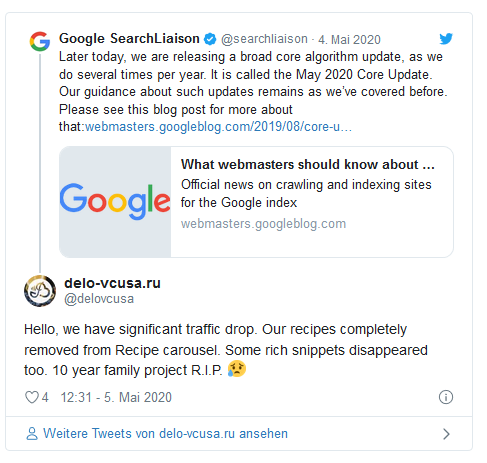Google published the second Core Update of 2020 in the middle of the Coronavirus Pandemic. Now that the rollout is complete, it’s time for a more detailed analysis of the adjustments Google has made. Marcus Pentzek, Chief SEO Consultant at Searchmetrics, and Niels Dahnke, Head of SEO at content marketing agency Suxeedo, have looked at the effects of the update and share their insights and analysis of the winners and losers of the Core Update in this blog post. The second Core Update in 2020 appears to be strongly related to E-A-T again.
Have you been affected by this Core Update? We can help with your SEO and Content strategy – get in touch with one of our experts to discuss solutions for your business.
Our analysts: Niels Dahnke and Marcus Pentzeck
 Niels Dahnke is Head of SEO for the Berlin-based content marketing agency Suxeedo, and a frequent speaker at international digital marketing conferences. At Suxeedo, this experienced online marketing specialist focuses primarily on technical search engine optimization and strategic consulting. Previously he worked as Head of SEO, SEA & Social Media at the media group Madsack.
Niels Dahnke is Head of SEO for the Berlin-based content marketing agency Suxeedo, and a frequent speaker at international digital marketing conferences. At Suxeedo, this experienced online marketing specialist focuses primarily on technical search engine optimization and strategic consulting. Previously he worked as Head of SEO, SEA & Social Media at the media group Madsack.
 Marcus Pentzeck is Chief SEO Consultant of the Searchmetrics Digital Strategies Group. He supports Searchmetrics clients with search engine optimization advice and assistance. Marcus has expertise and passion for international SEO (including China, plus more!). Prior to Searchmetrics, Marcus was the SEO Team Lead at UDG United Digital Group.
Marcus Pentzeck is Chief SEO Consultant of the Searchmetrics Digital Strategies Group. He supports Searchmetrics clients with search engine optimization advice and assistance. Marcus has expertise and passion for international SEO (including China, plus more!). Prior to Searchmetrics, Marcus was the SEO Team Lead at UDG United Digital Group.
E-A-T as an important factor?
When it comes to E-A-T (Expertise, Authority and Trust), Niels and Marcus believe that, “E-A-T signals are still main factor of this update, but strong E-A-T signals are not.” For instance, in former updates, usually websites with stronger signals would come out on top.
In contrast, Searchmetrics founder and CIO Marcus Tober, is of the opinion that there is not an E-A-T influence in this update. This is because in past updates, typically E-A-T optimized websites were among the biggest winners. This time, E-A-T optimized websites did not appear to be the big winners. He states, “The update seems to be somewhat broader in scope than previous Core Updates.” Another reason for his opinion is because analysis shows this update is not only focused on industries covering sensitive topics related to E-A-T, such as finance or health. Although these industries were impacted, in past Core Updates, there were always big winners in the health sector, such as WebMD or the Mayo Clinic, but not this time. “Google has again worked on weighting content factors together with brand factors, and possibly also included user data such as click through rates,” says Marcus Tober.
“Google has again adjusted based on weighting of content, brand factors and user data. The update seems to be somewhat broader than previous Core Updates and less focused on E-A-T topics.” Marcus Tober, Searchmetrics Founder and CIO
With E-A-T, Google refers to quality standards for websites. These standards are used in assessments conducted by Google Quality Testers and also used in the rankings – especially YMYL topics (Your Money, Your Life), which contain sensitive information about finances and health.
Marcus Pentzek, on the other hand, thinks in this May 2020 Core Update there may not be any big winners but rather many smaller winners. “Could it be that Google is correcting its former E-A-T efforts here because smaller websites, despite having high quality information and weaker ‘Authority’ (less backlinks), were not found among the really competitive keywords?”, he speculates.
“Perhaps Google simply opted for more diversity in the May 2020 Core Update, and giving more value to smaller websites.”
Marcus Pentzek, Chief SEO Consultant at Searchmetrics
So, was the May 2020 Core Update perhaps more of an E-A-T correction with an aim for more diversity rather than further development of these ranking principles?
This would mean for websites that were impacted did not do anything wrong, which fits with Google’s statements regarding Core Updates. Marcus concludes that perhaps Google has simply opted for more diversity and thus for an upgrade of smaller sites.
Quality counts more than authority
Both SEO experts see significant corrections and reassessments in terms of quality.
Marcus noticed that many publishers have seen hub pages fall in rankings – rankings fell for category or tag pages that collected text snippets and links to specific topics. “For a keyword like ‘North Korea’, I don’t need to see a major publisher’s tag page in the top 10 results,” says Marcus.
The user intent behind a search query seems to have played an important role in this update, notes Niels: “Anyone who has tried to combine everything on one target page and thus does not have a clear focus, apparently sends such unclear signals to the algorithm that such pages have lost their rankings.” This also applies to product pages, which are supposed to answer the most important questions with little SEO text.

“Anyone who has tried to bring everything about a topic onto one page and thus does not have a clear focus, obviously sends such unclear signals to the algorithm that these kinds pages have lost rankings in this update. So, it doesn’t help if you put SEO text at the bottom of a product page to answer the most important questions.”
Niels Dahnke, Head of SEO at Suxeedo
Pages without a strong enough link profile and brand are among the losers
Niels and Marcus agree that brands and sites with a strong link profile are among the winners – at least if the quality is right. “Domains with strong trust signals, such as domains with many high quality backlinks, seem to be among the winners here,” says Niels. Backlinks would not only strengthen a single subpage but have a positive impact on the entire domain.
Affiliate sites seem to be among the big losers of the May 2020 Core Update, as they do not have particularly high quality, or relevant content, and also lack a high quality link profile identifying them as a strong brand. The age of a domain does not seem to play a role here.
User signals are enormously important
Niels also sees the importance of good User Signals for good, sustainable Google rankings. “This makes it clear why negative User Signals cannot be completely compensated by a great link profile.” Here, too, it is evident that algorithms include a certain plausibility evaluation to compare their own evaluation with the help of User Signals.
If E-A-T is considered as a factor, then the requirements seem to have increased here, especially for YMYL topics, which is a problem for affiliate websites in particular.
In this context, Niels refers to a Suxeedo whitepaper on User Signals, in which the role of User Signals as a ranking factor is examined – practical examples are used to show how CTR, bounce rate and dwell-time can be optimized.
Google update as E-A-T correction
“There are three aspects that speak in favor of this update preferencing expertise (update losers do not have particularly high quality and relevant content), authority (high-quality backlink profile) and trust (strong brand, domain age),” Marcus concludes. He also adds: “You don’t have to be one of the strongest of the strong as long as you have a sound E-A-T foundation.”
He sees this as the core of Google’s E-A-T correction for the May update. “Dominant players are no longer assured top results if the quality is not right as many websites with a good E-A-T fundamental base have high quality content,” says Marcus.


“You don’t have to be one of the strongest of the strong as long as you have a solid E-A-T base. In my opinion, this seems to have been Google’s way of correcting for E-A-T.” Marcus Pentzek, Chief SEO Consultant at Searchmetrics
Marcus refers to the example of parents.com, which lost visibility in the core update in September 2019 and grew quite a bit during the Google core update in May:
parents.com is winning with the Google Core Update
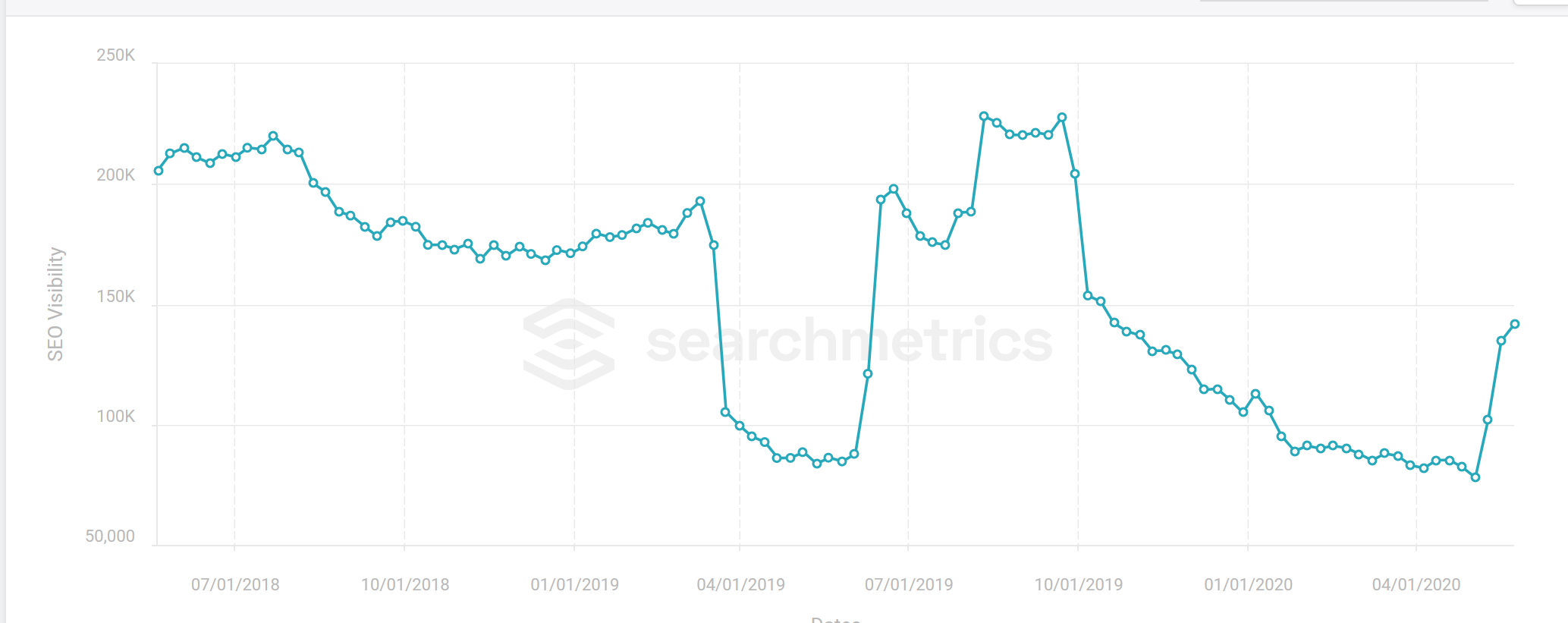

Niels also sees the May update more as an E-A-T correction of earlier Core Updates, which also fits with Google’s statement about the nature of a Core Update:
“It’s also important to understand that search engines like Google do not understand content the way human beings do. Instead, we look for signals we can gather about content and understand how they correlate with how humans assess relevance. How pages link to each other is one well-known signal that we use.”
The search for winners through the update has led Niels to Google’s own offers, such as play.google.com. Google’s own Play Store has been growing continuously for months. “Although the May update has brought a comparatively small increase of around 16 percent, it shows how Google’s own offers are continuing to expand and become more dominant in search,” says Niels.
Google Play Store with an enormous SEO visibility increase
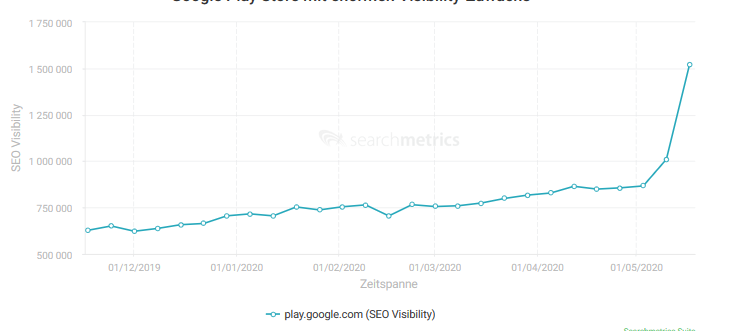

Marcus also points to the growth of Google’s own offerings, such as the September 2019 Core Update, where video content and ‘organic’ YouTube rankings displaced other results and led to increased SEO visibility of YouTube in the SERPs.
Local SEO: Google confirmed a bug
Niels and Marcus not only see numerous changes in terms of E-A-T through the May update, but also in the area of Local SEO. For domains that are actually easy to find regionally and that can even be classified as regional brands, Niels observed: “If you look at the changes in the area of Local SEO, you can see SEO visibility deteriorating at the time the update rollout on May 3rd.”
No Recovery after the update for houstonpress.com
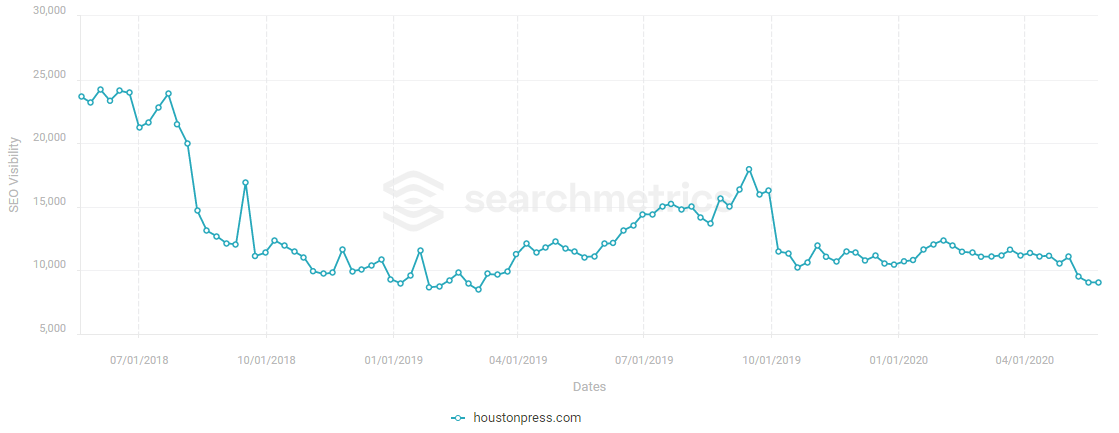

However, many regionally strong domains were also able to recover in the days following the start of the update rollout, for example, tennessean.com:
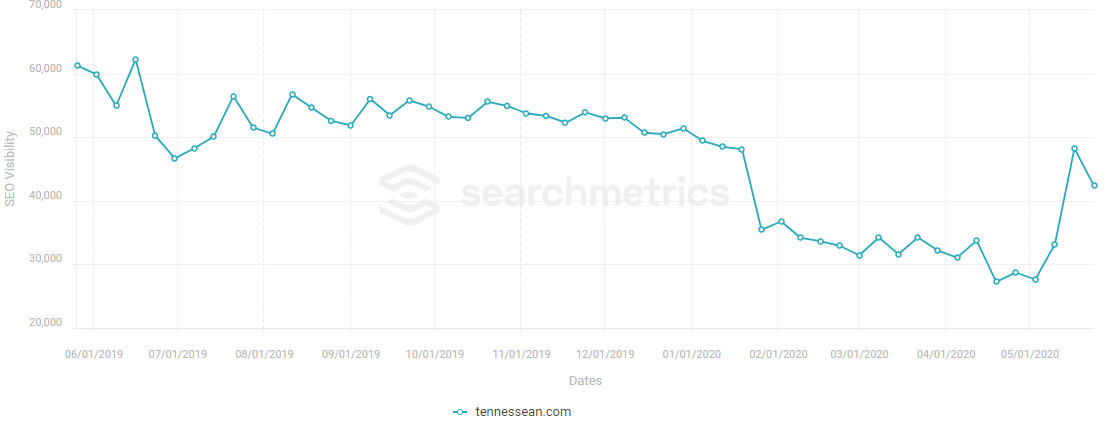

In addition to organic search, there have also been significant changes in how local results are displayed, says Niels. Particularly in the US, there has been a lot of speculation as to whether ‘local pack rankings’ are also affected by the current Core Update. Joy Hawkins asked Danny Sullivan on Twitter, how confirmed the observed volatility in local rankings was a bug, which already has been fixed:
Just wanted to update. Thanks for the examples. They helped us find a bug that we got resolved about about two weeks ago, and that seems to have stabilized things since.
— Danny Sullivan (@dannysullivan) May 28, 2020
Updates with curious movements
All in all, Niels gives Google a rather mediocre report regarding the quality of core updates. The May update also showed some algorithmic changes can only compensated with another Core Update. “Anyone affected by such an update must therefore either wait for the next update or, at least, significantly adjust their strategy,” says Niels.


“The changes of the last Core Updates may have brought some improvements, but I see a lot more junk domains and unhelpful content in my daily searches. Unfortunately, the current Google Update hasn’t changed that.”
Niels Dahnke, Head of SEO at Suxeedo
“Since 2018, there have been several Google updates resulting in significant losers that I don’t understand,” adds Niels. The changes of the last Core Updates may have brought some improvements, but he sees many more junk domains and more unhelpful content in his daily searches. Unfortunately, according to Niels, the current Google Update has not changed this.
Ad-hoc analyses not useful
Since January, Niels has seen higher volatility for many domains. And even after the core update, the algorithm takes time to to settled down. “The algorithm itself does not have to settle, but instead, the update rollout just needs some time. Google says that the rollout takes up to two weeks, so it’s only possible to make a serious evaluation of each core update after this period of time,” says Niels. We would all prefer to have an answer to the question, ‘What exactly does the update change and what do I have to do now?’ on the very first day of the rollout.
It’s critical to not judge who the winners are based on one day of visibility changes.
Google Update in the middle of the Coronavirus Pandemic causes resentment
The timing of the May 2020 Core Update has been criticized by some webmasters and SEOs. Sustaining online businesses in the middle of the pandemic is already challenge enough with the continuing severe restrictions worldwide. The current restrictions have led to a widespread decline in traffic and online sales for many businesses leaving many with an overall sense of uncertainly about the future. Criticism was shared via Twitter and in the Webmaster World Forum:
- “Google please, we are in the midst of a pandemic, can’t it wait?” Eby Bekee (@QueenPhloxie) via Twitter
- “Is an algorithm update so important when most business are shut down and user searches have declined in many industries?” Web Trainings (@webtrainings) via Twitter
- “It’s pandemic and I don’t want Google updates to crush me at this time of financial crisis. I’m scared 🙁 ”MayankParmar via WebmasterWorld-Forum
May 2020 Core Update: Renamed to ‘Pandemic Update’ or ‘Force Update’?
It has become a tradition for Google to announce major core updates – significant, broad adjustments to the search algorithms and systems – via Twitter. This time, the announcement of the rollout was communicated on May 4th, 2020. Announcements such as these are an attempt from Google to prevent algorithm update rumours getting out of control plus to announce the name of the update themselves. The names Google gives to core update releases are deliberately kept neutral, with the “May 2020 Core Update” as no exception.
Taking inspiration from the current crisis and the blandness of this update name, webmasters and SEOs who clearly do not find Google’s official naming rules too creative have their own ideas:
- “Corona Update” or “Pandemic Update”: Timing the rollout in the midst of the pandemic inspires alternative naming suggestions in connection with the Coronavirus, making it sure to be memorable long into the future.
- “Force Update”: May 4th is International Star Wars Day and the same day that Google announced the Core Update. “May the Force – or Fourth – be With You”, and the good rankings, of course!
We will wait and see which name will eventually make it into the history books.
May 2020 Core Update – What has Google changed?
As per usual, Google has not revealed precise information about what has changed in the search algorithm or which industries or topics are a special focus of the Google Update. It also remains unclear whether there is a connection to the Coronavirus Pandemic and the changing search behaviour of Google users.
According to Google, the entire period of the rollout takes one to two weeks until all changes are live. Google often undertakes tweaks post-rollout – they commonly will make adjustments due to unintentional or undesirable ranking results.
Google Senior Webmaster Trends Analyst, John Mueller, has not revealed details about the May update and refers to the general Google blog post on the subject when asked about it:
Impact of the Google May 2020 Core Update
In the meantime, some webmasters and SEOs have reported on the effects of the Google Core Update. According to the signs so far, there are several industries and page types that can be expected to be affected by the changes. According to initial statements from the Webmaster World Forum and Twitter, there are changes in a wide range of industries – from recipes to tech, health or even finance. There are also some early signs cryptocurrency content has been impacted according to Forbes in this article.
Several recipe website owners noticed significant traffic losses, with the main reason being the disappearance of URLs from the recipe carousel as well as the disappearance of rich snippets for recipe results. It could be the case that Google readjusted specifically for this segment, especially because search results for recipe topics contain a lot of additional information displayed as rich snippets, such as images, ratings, cooking time and other information.
Further reports from webmasters and SEOs on the ranking changes:
- Health: “We lost in May 2018, we lost in August 2018 (Med). But this update is the worst update (for us) I ever saw in my years of SEO. We lost everything again. At this moment we got hit harder then 2018.” Sofie77 via WebmasterWorld Forum
- Tech: “It’s getting rough…. – 40% Traffic compared with last week. Tech related website.” ChokenBako via WebmasterWorld Forum
- Finance & Health: “Okay, now I am seeing crazy swings. Monitoring KWs in various verticals, and so far, the volatility appears massive. Some major national brands that were rank at the top for very competitive financial KWs dropped 10+ rankings. Seeing massive swings in health as well. This looks big so far.” HereWeGo123 via WebmasterWorld Forum
- Dating: “Over 40% down so far for a relationship advice site.” Dantes100 via WebmasterWorld Forum
In addition, users suspect that content related to the pandemic will receive more attention from Google. We will monitor our Searchmetrics ranking data and SERP changes and will update this article after a few days as new information becomes available.
Overview of Google Core Updates
Since 2019, Google has already confirmed or announced six Core Updates in its own communication channels and branded them with a name. Here’s an overview:
| Update-Name | Date | Features of the Google Update | Google-Statement |
| Google May 2020 Core Update | May 4th 2020 | In the midst of the corona pandemic, Google is announcing its second Core Update 2020, and the changes resulting from this Core Update appear to affect many industries; from prescriptions to health to finance. | Google Announcement via Twitter |
| Google January 2020 Core Update | January 13th 2020 | The first official Core Update of 2020 was rolled out on 13th January 2020. There is not yet any information regarding its impact. With this update, Google continues its communication strategy of (pre-)announcing Core Updates on Twitter. | Google Announcement via Twitter |
| Google November 2019 Core Update | November 7th 2019 | Webmasters in the USA who run affiliate sites have observed massive changes in the travel, food and health sectors. Google has not commented on the changes, but SEO experts have described the update as “aggressive”. | Retrospective confirmation via Twitter |
| Google September 2019 Core Update | September 24th 2019 | The September 2019 Core Update was rolled-out globally, starting on the 24th of September. This Google Update focused on improvements in the content quality in the SERPs. For the second time, Google pre-announced a core algorithm update in advance. | Google Announcement via Twitter |
| Google June 2019 Core Update | June 3rd 2019 | Google set a new precedent with its “June 2019 Core Update” by, for the first time in the history of Google Updates, announcing the roll-out of a major core algorithm change in advance. This update was the second major update of 2019 altering the core algorithm, and was rolled out on the 3rd of June, as preannounced. | Google Announcement via Twitter |
| Google March 2019 Core Update | March 12th 2019 | In this global core algorithm update, there were ranking shifts for keywords related to health and other sensitive topics. The algorithm was also adjusted to favor trust and expertise, as well as user signals. | Retrospective confirmation via Twitter |
You will find an overview here: Google Updates.
Google Updates: What Webmasters & SEOs can do
In late summer 2019, Google published a post in the Google Webmaster Blog explaining in detail the algorithm changes behind Core Updates and what webmasters and SEOs can do if they are impacted by a Google Core Update.
Those who have seen ranking losses due to an update, “have neither violated Google Webmaster Guidelines nor undergone any manual or algorithmic action.” The updates are intended to improve the overall quality of search results. According to Google, these changes could see websites that previously ranked lower suddenly rank higher and vice versa. An example comparison showing how a Google Core Update can work is looking over a list of the 100 best movies of 2015 – this list will be updated a few years later in 2019 and will probably change as new movies are added over time.
Google recommends webmasters and SEOs whose websites have been hit by a Google Update to “focus on delivering the best possible content” and suggests conducting a website audit asking questions in the following four areas:
Content & Quality: Does the website offer original, valuable content that goes beyond copying? Are meta titles and descriptions appealing and designed to match the content? Would you as a webmaster share this content with friends?
Expertise: Is the content trustworthy? Does the page contain errors? As a webmaster coming to the site via Google, would you trust it yourself?
Presentation & Production: Does the content look well researched and produced or does it seem more like mass production? Are there too many ads? Does the site load appealingly on all devices?
Competitive Comparison: Does the website offer added value compared to other competitors? Does the content meet the expectations of the users?
Webmasters can perhaps get a first impression by answering these questions honestly and examine their own website in comparison with competitors, especially with regard to the value of the content.
By the way, you can receive relevant news about SEO and content marketing in our newsletter. Sign up for free today!


